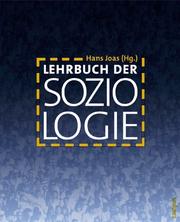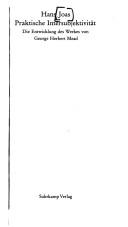| Listing 1 - 10 of 103 | << page >> |
Sort by
|
Book
ISBN: 074560062X 9780745600628 Year: 1985 Publisher: Cambridge: Polity press,
Abstract | Keywords | Export | Availability | Bookmark
 Loading...
Loading...Choose an application
- Reference Manager
- EndNote
- RefWorks (Direct export to RefWorks)
Mead, George H. --- Intersubjectivity --- Interaction (Philosophy) --- Sociologists --- Philosophy, American --- Philosophy, Modern --- Mead, George Herbert, --- 130.2:316 --- 316.2 MEAD, GEORGE HERBERT --- #SBIB:316.20H16 --- #SBIB:316.21H71 --- Philosophy --- Ontology --- Phenomenology --- Social psychology --- Subjectivity --- Filosofie van de cultuur. Cultuurfilosofie. Cultuursystemen. Kultuurfilosofie-:-Sociologie --(algemeen) --- Sociologische richtingen. Sociologische scholen. Sociologen--MEAD, GEORGE HERBERT --- Grondleggers van de sociologie: U.S.A. --- Theoretische sociologie: symbolisch interactionisme --- Mead, George Herbert --- 316.2 MEAD, GEORGE HERBERT Sociologische richtingen. Sociologische scholen. Sociologen--MEAD, GEORGE HERBERT --- 130.2:316 Filosofie van de cultuur. Cultuurfilosofie. Cultuursystemen. Kultuurfilosofie-:-Sociologie --(algemeen) --- Grondleggers van de sociologie: U.S.A --- Mead, G. H. --- Sociologists - United States --- Philosophy, American - 20th century --- Philosophy, Modern - United States --- Mead, George Herbert, - 1863-1931
Book
ISBN: 3518283650 Year: 1989 Publisher: Frankfurt am Main Suhrkamp
Abstract | Keywords | Export | Availability | Bookmark
 Loading...
Loading...Choose an application
- Reference Manager
- EndNote
- RefWorks (Direct export to RefWorks)

ISBN: 0226400425 9780226400426 Year: 1993 Publisher: Chicago: University of Chicago press,
Abstract | Keywords | Export | Availability | Bookmark
 Loading...
Loading...Choose an application
- Reference Manager
- EndNote
- RefWorks (Direct export to RefWorks)
Sociology --- Pragmatism

ISBN: 3593363887 Year: 2001 Publisher: Frankfurt Campus
Abstract | Keywords | Export | Availability | Bookmark
 Loading...
Loading...Choose an application
- Reference Manager
- EndNote
- RefWorks (Direct export to RefWorks)

ISBN: 3518075330 Year: 1980 Publisher: Frankfurt am Main
Abstract | Keywords | Export | Availability | Bookmark
 Loading...
Loading...Choose an application
- Reference Manager
- EndNote
- RefWorks (Direct export to RefWorks)
Interaction (Philosophy) --- Intersubjectivity --- Philosophy --- Ontology --- Phenomenology --- Social psychology --- Subjectivity --- Mead, George Herbert, --- Mead, G. H. --- Mead, George H.
Book
ISBN: 080479278X 9780804792783 9780804788731 0804788731 9780804792776 0804792771 Year: 2014 Publisher: Stanford, California
Abstract | Keywords | Export | Availability | Bookmark
 Loading...
Loading...Choose an application
- Reference Manager
- EndNote
- RefWorks (Direct export to RefWorks)
Many people these days regard religion as outdated and are unable to understand how believers can intellectually justify their faith. Nonbelievers have long assumed that progress in technology and the sciences renders religion irrelevant. Believers, in contrast, see religion as vital to society's spiritual and moral well-being. But does modernization lead to secularization? Does secularization lead to moral decay? Sociologist Hans Joas argues that these two supposed certainties have kept scholars from serious contemporary debate and that people must put these old arguments aside in order for debate to move forward. The emergence of a "secular option" does not mean that religion must decline, but that even believers must now define their faith as one option among many. In this book, Joas spells out some of the consequences of the abandonment of conventional assumptions for contemporary religion and develops an alternative to the cliché of an inevitable conflict between Christianity and modernity. Arguing that secularization comes in waves and stressing the increasing contingency of our worlds, he calls upon faith to articulate contemporary experiences. Churches and religious communities must take into account religious diversity, but the modern world is not a threat to Christianity or to faith in general. On the contrary, Joas says, modernity and faith can be mutually enriching.
Book
ISBN: 9783518587034 Year: 2017 Publisher: Berlin Suhrkamp
Abstract | Keywords | Export | Availability | Bookmark
 Loading...
Loading...Choose an application
- Reference Manager
- EndNote
- RefWorks (Direct export to RefWorks)
Book
ISBN: 9780190933272 Year: 2021 Publisher: New York, N.Y. Oxford University Press
Abstract | Keywords | Export | Availability | Bookmark
 Loading...
Loading...Choose an application
- Reference Manager
- EndNote
- RefWorks (Direct export to RefWorks)
Book
ISBN: 3451390647 9783451390647 9783451825019 9783451825026 3451825015 3451825023 Year: 2022 Publisher: Freiburg im Breisgau Herder
Abstract | Keywords | Export | Availability | Bookmark
 Loading...
Loading...Choose an application
- Reference Manager
- EndNote
- RefWorks (Direct export to RefWorks)
(Produktform)Hardback --- (Produktform (spezifisch))With dust jacket --- Glaube --- Katholische Kirche --- Kirchenreform --- Soziologie --- Kirchenkrise --- Kirchenkritik --- Synodaler Weg --- Säkularisierung --- Communities --- Mission of the church --- Christian sociology --- 21*01 --- 21*01 Godsdienstfilosofie: christelijke religie: filosofisch en rationeel --- Godsdienstfilosofie: christelijke religie: filosofisch en rationeel --- Christian social theory --- Social theory, Christian --- Sociology, Christian --- Sociology --- Church --- Religious aspects --- Christianity --- Mission --- Purpose
Book
ISBN: 9783518587584 9783518766422 Year: 2020 Publisher: Berlin : Suhrkamp,
Abstract | Keywords | Export | Availability | Bookmark
 Loading...
Loading...Choose an application
- Reference Manager
- EndNote
- RefWorks (Direct export to RefWorks)
Liberty --- Philosophy. --- Religious aspects. --- Hegel, Georg Wilhelm Friedrich, --- Nietzsche, Wilhelm Friedrich, --- Criticism and interpretation.
| Listing 1 - 10 of 103 | << page >> |
Sort by
|

 Search
Search Feedback
Feedback About UniCat
About UniCat  Help
Help News
News